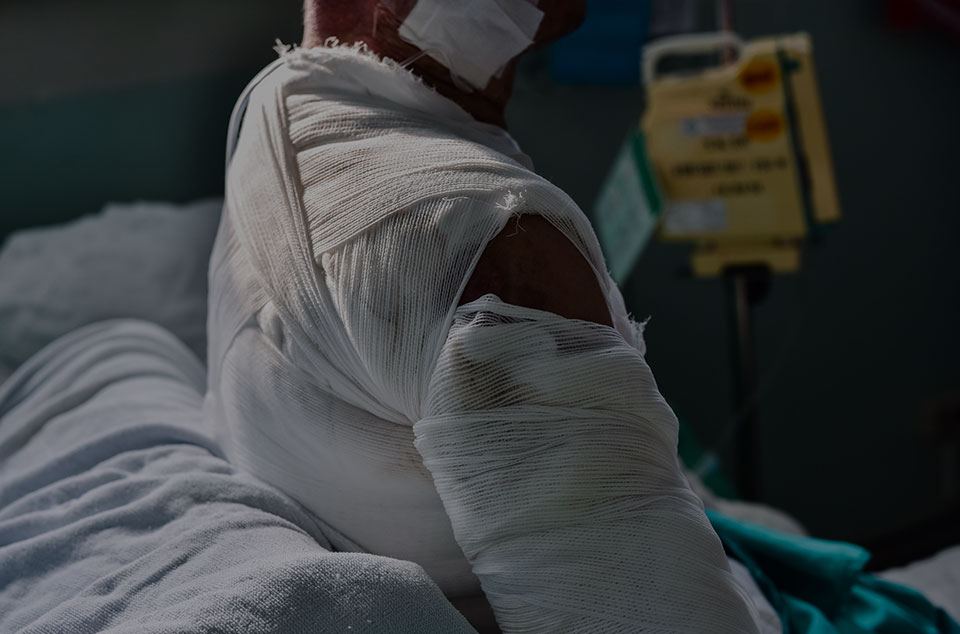An estimated 5,579 motorcyclists were killed in 2020, according to the National Highway Traffic Safety Administration (NHTSA). This figure has risen since 1994 when there were 2,320 motorcycle fatalities. A rise in fatalities is not altogether surprising, as the number of registered motorcycles in the country increased from 4.3 million in 2002 to about 8.6 million in 2021, and the number of new motorcycles sold significantly decreased from about 936,000 in 2002 to about 550,000 in 2021, according to the latest in a new motorcycle sales survey from Statista.
Each Houston motorcycle accident attorney at Morrow & Sheppard LLP knows there is generally no such thing as a minor motorcycle accident, given how exposed and vulnerable to injury motorcyclists can be. In addition to death, there are innumerable other life-altering injuries that can occur in a motorcycle accident, including traumatic brain injuries, concussions, broken bones, soft tissue damage, spinal cord injuries, and facial disfigurement.
Motorcycle Accident Statistics
At Morrow & Sheppard LLP, we know motorcycle accidents are much more than just numbers on a page. We work with accident victims firsthand and see the devastation up close and personally. Yet, it’s important to look at the statistics to have an idea of how rampant this issue has become in Texas and throughout the country. The more we know about motorcycle accidents, the better our chances of preventing them. Here are a few startling facts:
- In 2020, 5,579 motorcyclists throughout the United States died in motorcycle accidents. This is more than double the number of motorcyclist deaths in 1997. Motorcyclist fatalities accounted for 14% of all crash deaths in 2016.
- The majority (75%) of motorcycle accidents are collisions with other vehicles. Only about 25% are single-vehicle crashes. Vehicle failure accounts for less than 3% of all motorcycle accidents.
- The most common cause of multi-vehicle accidents are other vehicles ignoring the motorcycle’s right-of-way. The failure of other drivers to recognize and respect motorcycles in traffic is the driving force behind most motorcycle crashes.
- Throughout Texas in 2020, 483 motorcycle operators and passengers died in traffic collisions. Forty-nine percent of these motorcyclists were not wearing helmets at the time of the accident.
If drivers paid more attention to the roadways, there would be fewer motorcycle accidents. Unfortunately, distractions behind the wheel abound. Cell phone use behind the wheel has contributed to the increasing number of motorcycle accidents. It is already more difficult for drivers to detect smaller motorcycles on the roadway. If a driver is looking at a cell phone, it drastically increases the risk of the driver failing to see oncoming vehicles. Houston drivers who fail to yield the right-of-way, turn in front of motorcycles, cut them off, or drive too closely end up costing motorcyclists their lives.
Texas Motorcycle Laws
As is the case in all states, motorcyclists have the same rights and responsibilities as other drivers in Texas. Motorcyclists can ride on rural roads and all highways in Texas, and must obey all traffic laws – including speed limits, traffic signals, and not operating under the influence. Motorcycles can ride two abreast in a single lane, but may not ride two abreast with passenger vehicles in one lane. Lane splitting is not legal in Texas. Other motor vehicles must treat motorcycles as they would any other vehicle, yielding the right-of-way when appropriate.
Motorcycle operators and their passengers must wear helmets in Texas, with a few exceptions. Helmets must meet the applicable standards according to federal law. The exception to the law is if the motorcycle operator is at least 21 and he or she has completed a motorcycle training and safety course. Passengers may also be exempt from the helmet law if they are 21 and have a health insurance plan with medical benefits. Motorcyclists must also possess proper licensure, along with mirrors, horn, tail lamp, stop light, rear red reflector, and a headlamp on their vehicles. To learn more about how motorcycle laws in Texas may impact your claim, reach out to a qualified Houston motorcycle accident attorney.
Common Causes of Motorcycle Accidents in Houston
Houston motorcycle accidents can result from any number of factors, from operator intoxication to an animal running into the road. There are, however, several crash causes that are more common than others. Learning the most common causes can help motorcyclists avoid risks and prevent accidents. A few are as follows:
- Passenger vehicle driver inattention/distraction
- Driver failing to yield the right-of-way at intersections
- Cars making left-hand turns into motorcycles
- Cars making unsafe turns and striking motorcycles head-on
- Speeding/other broken roadway rules
- Motorcycle lane-splitting
- Intoxicated drivers
- Roadway defects, such as potholes and loose gravel
Almost all motorcycle accidents are preventable. They occur because someone failed to uphold his/her duties of care to other roadway users. The at-fault party is often the driver of the passenger vehicle. In some cases, an injured motorcyclist can sue more than one party for an accident. For example, a manufacturer for a defective part, a business for its negligent driver, or the government for road defects, all of whom may be responsible for an accident. Talking to a Houston motorcycle accident lawyer can help you determine fault and file a claim.
Motorcycle Safety Tips
It may not always be possible to avoid a collision with another driver or fixed object, but prudent motorcyclists can decrease their chances of a crash with a few best practices and safety tips. First, motorcyclists and their passengers should always wear helmets, even if they are legally exempt from doing so. Wearing a helmet greatly reduces the odds of a serious to fatal head/brain injury. If you’re not wearing a helmet in an accident but the law requires that you do so, the defense could use this against you to argue that a head or brain injury would not have been as severe had you obeyed the law. Play it safe; wear a helmet at all times in Texas, along with other safety gear.
Staying safe as a motorcyclist often requires predicting what other drivers are going to do. Never assume a passenger vehicle driver sees you or is going to do the right thing, such as yield the right-of-way. Instead, assume the opposite – the driver is going to cut you off, slam on the brakes, or otherwise drive unsafely. Practice defensive driving, don’t share lanes with other vehicles and keep a safe distance from cars at all times. Know your skill level, and take safety courses to improve. Maintain your motorcycle to prevent breakdowns, and avoid roadway hazards as much as possible.
How Technology Is Enhancing Motorcycle Safety
There have of course been incredible advances over the years in safety technologies for motorcyclists, including the materials used in protective equipment (helmets, jackets, pants, gloves, boots, etc.) and safety equipment on the bicycle itself (such as airbags and crash bars). But serious injuries can still result, particularly when a motorcyclist comes into contact with another vehicle. As long as all vehicle drivers are mindful of others with whom they are sharing the road, accidents should be prevented. But all too often, cars and other vehicles on the road are not paying attention when a motorcycle is nearby, and fail to recognize that even a minor accident for the motorcyclist can be very serious. Not paying attention and not recognizing the heightened risks can cause a vehicle to cut off a motorcyclist, swerve into them, get too close to the motorcyclist, and a host of other actions that can seriously injure the motorcyclist. If you or somebody you love was injured in an accident caused by another negligent driver, consider speaking with a reliable Houston personal injury lawyer experienced in motorcycle accident cases.
Motorcycle Accident Injuries
The nature of motorcycle accidents lends itself to some types of injuries more than others. When a motorcycle collides with a passenger vehicle, the impact often throws riders off the motorcycle. This can lead to severe road rash, abrasions, and traumatic tattooing. Traumatic tattooing occurs when rocks, asphalt, and other debris embed in the flesh. Road rash is prone to infection without proper medical treatment, and it can leave scars. Other common motorcycle crash injuries include:
- Broken bones. Bones will fracture if they cannot withstand the pressure an impact exerts on them. The most common broken bones in motorcycle collisions are in the lower extremities. A leg may break if the motorcycle topples over onto the rider. Wrist and arm fractures are also common, as trying to break the fall is a natural instinct.
- Head and brain injuries. While motorcycle helmets reduce the risk of head injury by almost 70%, they do not guarantee the rider’s safety. Even with a helmet, riders can suffer blows to the head that cause harms such as concussion or traumatic brain injury. The risk of fatal head injury greatly increases without helmet use.
- Spinal cord injury. Spine injuries can occur if the rider falls in a way that fractures the spine or if the motorcycle or motor vehicle crushes the rider in the impact. Spine injuries can cause permanent loss of sensation and motor function, requiring many victims to have full-time live-in care.
Many motorcycle accident survivors walk away with permanent scars, disfigurements, traumatic amputations, or lifelong disabilities – if they walk away at all. Motorcycle collisions are often highly traumatic as well, leaving non-physical scars for the victim to live with. Injured motorcyclists have the right to hire a Houston motorcycle accident attorney and pursue financial compensation for all of these losses and others through the civil court system.
What to Do After a Motorcycle Accident in Houston
There are certain steps you can take after a crash to maximize your odds of a successful settlement or verdict in the future. They mostly involve taking care of your personal health and documenting the facts of your accident. Take the following steps after a crash:
- Call 911. Motorcycle crashes almost always meet the Texas crash reporting requirements, which are if the accident causes injuries, deaths, or property damage exceeding $1,000.
- Get medical help. Wait for police to arrive from a safe location, out of the road if possible. Seek attention for your injuries right away.
- Gather information. The more details you can record about your crash, the better. Take note of your location, the names of all parties involved, insurance information, and other important details.
- Don’t admit fault. Do not apologize to the other driver or admit that the crash was your fault. Wait for police to arrive and determine how the crash occurred. If an insurance claims adjuster calls you after the crash, do not give a recorded statement without talking to a Houston motorcycle accident attorney.
- Call a lawyer. Motorcycle crashes can cause severe to fatal injuries, along with thousands of dollars in medical costs. Before accepting a quick insurance settlement, call an attorney to discuss how much your claim is actually worth.
The top-rated motorcycle accident attorneys at Morrow & Sheppard LLP know how to handle complex motorcycle accident claims, regardless of what actions the victim did or did not take following the crash.
Hire an Aggressive Motorcycle Accident Lawyer
If you or a loved one has been injured in connection with a motorcycle, the experienced motorcycle accident lawyers at Morrow & Sheppard LLP can help. Please call our office at (800) 489-2216 or contact us online to schedule a free, confidential consultation.


























































